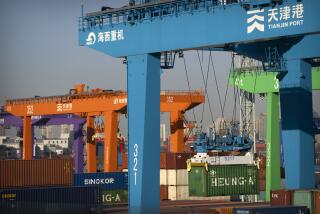Buoyant Industrial Economies Forecast by Paris Think Tank
- Share via
PARIS — The leading non-communist industrial economies, which appeared to be on the brink of a recession a year ago, are at their most buoyant since the early 1970s, the Organization for Economic Cooperation and Development said today.
A half-yearly report by the Paris-based economic affairs think tank said industrial output in its 24 member nations has grown at an annual rate of more than 4% since mid-1987.
The brisk expansion has been widespread. Investment in industry has been growing especially fast.
“This unusually favorable conjuncture provides national authorities with the opportunity to push ahead with policies which would underpin and sustain the improvement in the economic climate,” the organization’s report said.
It added, however, that unemployment would generally remain high and that global inflation is edging up, running at around 4%. That should be dampened by some slowing of the expansion, the organization predicted.
The report said uncertainty persists about further correction of the trading imbalances of the three largest economies, with the United States still running huge deficits and Japan and West Germany having large surpluses.
The organization raised its growth projections for all major industrial economies from predictions made in June, forecasting that they would expand by 4% this year and by 3.25% in 1989. In early summer the organization had foreseen growth of 3% and 2.5% respectively.
For 1990, the agency’s first estimates are that the global expansion will slow to 2.75%.
The outlook differs dramatically from a year ago when, just two months after the worst stock market crash since 1929, the organization said “prolonged or acute financial market turmoil could even carry the risk of a recession accompanied by higher interest rates.”
The organization gives high marks to governments for cooperating to improve business confidence. A strong gain in industrial investment was “an indication that ‘animal spirits’ have been raised in most (member) countries.”
But it added: “The dollar nevertheless remains vulnerable to pressures in exchange markets and a sharp cumulative decline . . . would threaten the improved economic situation.”
More to Read
Inside the business of entertainment
The Wide Shot brings you news, analysis and insights on everything from streaming wars to production — and what it all means for the future.
You may occasionally receive promotional content from the Los Angeles Times.








